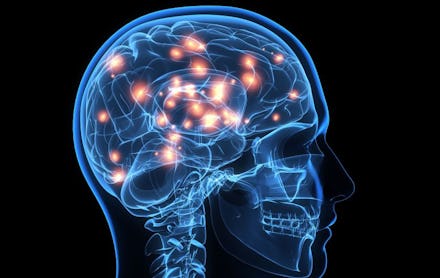Scientists Have Discovered That Losing Weight Actually Transforms Your Brain

The news: Body fat isn't just weighing down your belly — it's bad for your brain. Fortunately, new research has demonstrated that the effects of obesity on the brain are reversible and can be countered with weight loss.
A study recently published in the Journal of Clinical Endocrinology & Metabolism has found that getting rid of excess fat — in the case of the study, through weight loss surgery — has the ability to reverse alterations in brain activity caused by obesity, and to improve cognitive abilities related to planning, strategizing and organizing. Additionally, such changes could potentially reduce the chances of eventually developing devastating neurological diseases like Alzheimer's.
Simply put, gaining too much weight can potentially do serious damage to your brain, but new science shows that losing that weight can reverse these damaging effects — something that was, until now, thought nearly impossible.
The science: The researchers examined the brains of 17 obese women with PET scan technology and neuropsychiatric evaluations before and after bariatric surgery. The Roux-en-Y Gastric Bypass surgeries reduced stomach size and/or trimmed the length of the patients' small intestines, which were expected to restrict the amount of food the women could consume before feeling full.
Not only did the procedures help the women shed pounds, the women also performed better on executive function tests, which measure the brain's ability to connect past and current events. It also helped regulate activity in the posterior cingulate gyrus, which is closely linked to the onset of Alzheimer's disease. Lead researcher Dr. Cintia Cercato of the University of São Paolo said in the journal release that the scientists "suspect the procedure may contribute to a reduced risk of Alzheimer's disease and other forms of dementia."
But to be clear, obesity was not making the women any less capable or less smart — it was just making their brains work harder to produce the same results, which can potentially cause various problems.
"Our findings suggest the brain is another organ that benefits from weight loss induced by surgery," Dr. Cercato added in the report. "The increased brain activity the obese women exhibited before undergoing surgery did not result in improved cognitive performance, which suggests obesity may force the brain to work harder to achieve the same level of cognition."
How is this happening? Time's Alexandra Sifferlin writes that researchers don't quite understand the how and why of the complex chemical changes within the brain of an obese person, but that researchers theorize it's a "chain-of-events" type situation. For example, Alzheimer's is linked with insulin resistance, which itself is often caused by obesity. Other research has shown that high levels of fat are associated with hormonal changes which can impact the brain, including disruptions to stress hormones which regulate eating. NIH researcher Dr. Lenore Launer went so far as to claim "belly fat is its own disease-generating organism."
Why you should care: This study is just another to link weight loss among the overweight with a variety of health benefits. That's particularly important because the U.S. obesity rate is still reaching record highs. As scientist learn more about the various effects that a little too much extra weight can have on the human body, it's becoming clear that all kinds of afflictions from heart disease to Alzheimer's become more likely among the obese. Curbing the trend is particularly important because it will save us all a lot of money, medical resources and grief down the line.